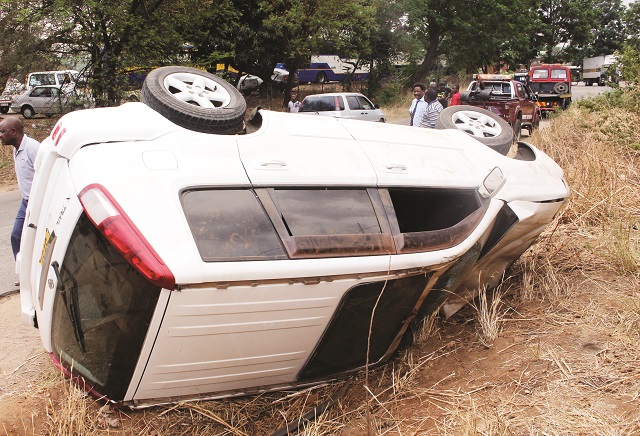Police patrols can help reduce accidents


Spikes thrown by Traffic Police officers almost claimed lives just outside the Bulawayo city centre recently. The police fled the scene after realising that the vehicle had overturned
Saul Gwakuba Ndlovu
The spiking of a kombi by a traffic police officer in Bulawayo recently caused public outrage, which resulted in the intervention of the ZRP’s anti-riot squad.
The incident occurred along Herbert Chitepo Street, near the robot-controlled intersection of that thoroughfare and 9th Avenue.
There were no injuries to the kombi passengers but a rear wheel of the vehicle was punctured.
Traffic police officers are found at several spots along the city’s streets.
They monitor motor vehicles, to see whether or not they are licensed, whether drivers have licences, whether they are travelling within the accepted speed limits, whether or not they (drivers) are sober, and whether the vehicles are roadworthy, are not overloaded, and are duly registered.
It is also likely that the police check for stolen motor vehicles in the process. All this is done at roadblocks, the large number of which causes motorists to complain.
The Herbert Chitepo Street incident was, of course, reported to the police by the kombi operators, and we can hope that due legal process was used to deal with the matter.
Roadblocks are a very necessary part of all road traffic police operations, and certainly contribute to the reduction of road traffic accidents.
They should, however, not be so many along a particular road or roads that they become an inconvenience to motorists. One would have thought that two roadblocks, and not four, are adequate on a 100km stretch of a road such as the Bulawayo-Plumtree highway.
However, in situations when the police are actually looking for a targeted law breaker or law breakers, the number could be necessarily increased.
Such occasions are rare for obvious reasons. In Zimbabwe, we very often come across situations where there are six roadblocks on a 100km-long stretch of a highway as is usually the case between Bulawayo and Shangani.
The question one is bound to ask about such a situation is: What fault or faults do traffic police officers think they can find in or with vehicles at the second, third, fourth and fifth roadblocks which could not have been found by the first roadblock?
Incidentally, we should acknowledge that one of the crimes associated with road motor traffic is smuggling, a relatively common crime in Zimbabwe.
But if a motor vehicle carrying contraband leaves Bulawayo for Gweru is not detected and caught on the city’s outskirts for whatever reason, it is bound to be detected at a roadblock on the outskirts of Gweru.
There is no need for a roadblock at Ntabazinduna, and others at Lochard, Shangani and so on. It is difficult to understand, let alone appreciate, the rationale behind the decision to plant two or three roadblocks between the one on Bulawayo’s and other on Gweru’s outskirts.
A reduction of roadblocks can release a large number of ZRP personnel who could be deployed to patrol at night in the country’s most densely populated areas, particularly urban centres.
While we are still on roadblocks, it is important to comment on the current highly deplorable situation whereby tens of private motor vehicles openly pirate in the country’s urban centres.
In Bulawayo, some of them now seem to have established ranks of their own from where they operate right under the noses of police personnel. I have seen two or three such vehicles without registration number plates at the corner of Fort Street and 8th Avenue, diagonally opposite the library, and others at the corner of Robert Mugabe Way and 8th Avenue.
It boggles one’s mind to see those vehicles, and then come across a police roadblock along Matopos Road, and some of those private motor vehicles actually ply that route, that is Bulawayo-Four Winds suburb.
Two very pertinent questions come to one’s mind each time one sees these private taxis (for that is what they are), and the questions are: Why do the drivers of those private cars operate so openly as if they are not breaking any law? Why does the ZRP act extra-thoroughly against officially registered kombis but seem to ignore these unregistered private motor vehicles?
We are, of course, very much aware of the parlous state of country’s economy, and that in such a condition, the old dictum “necessity knows no law” should be taken into consideration.
The modern world is administered on the principle that “the law protects those who uphold it and punishes those who break it”.
A good example is that about a man who was badly injured in a motor car accident a few metres from a pharmacy at midnight. He needed bandages to dress his wounds, and decided to break into the pharmacy.
He was arrested while still inside the pharmacy, taken to court the following day, charged with burglary and theft, duly convicted and sentenced in spite of his plea that he broke into the pharmacy because he indisputably needed bandages to save his life.
In the case of our private taxis, the ZRP should uphold the law by rounding up all pirate taxis; take them to court where the law should be applied without fear or favour.
It can be hoped that after their court appearance, owners of such vehicles would thereafter apply for their official registration as taxis.
The resolute application of all relevant laws pertaining to roads and road traffic would reduce the incidence of accidents. The ZRP can contribute to that reduction process by strategically patrolling the country’s highways right round rather than by a multiplicity of roadblocks.
Saul Gwakuba Ndlovu is a retired, Bulawayo-based journalist. He can be contacted on cell 0734 328 136 or through email. [email protected]











Comments